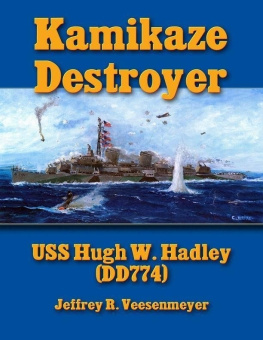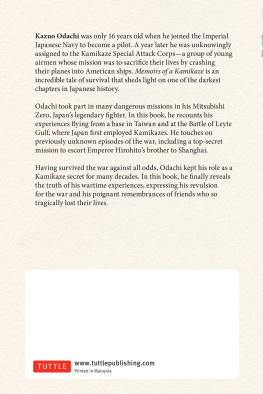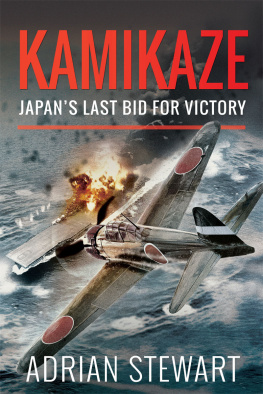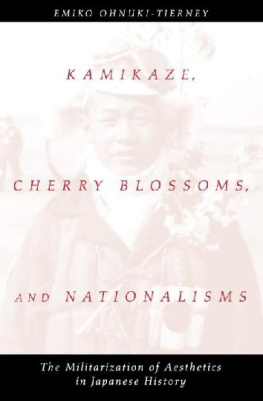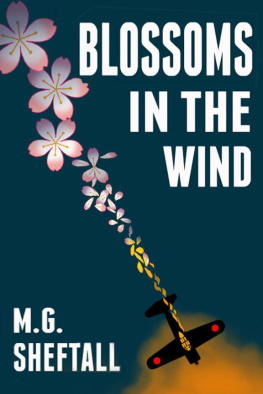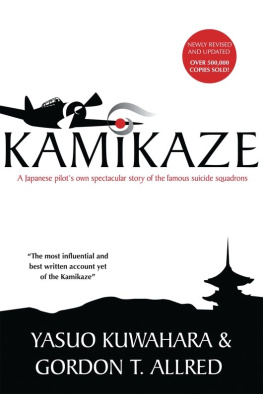Henry Roberts - Kamikaze Pilots of World War II
Here you can read online Henry Roberts - Kamikaze Pilots of World War II full text of the book (entire story) in english for free. Download pdf and epub, get meaning, cover and reviews about this ebook. year: 2014, genre: Romance novel. Description of the work, (preface) as well as reviews are available. Best literature library LitArk.com created for fans of good reading and offers a wide selection of genres:
Romance novel
Science fiction
Adventure
Detective
Science
History
Home and family
Prose
Art
Politics
Computer
Non-fiction
Religion
Business
Children
Humor
Choose a favorite category and find really read worthwhile books. Enjoy immersion in the world of imagination, feel the emotions of the characters or learn something new for yourself, make an fascinating discovery.

- Book:Kamikaze Pilots of World War II
- Author:
- Genre:
- Year:2014
- Rating:5 / 5
- Favourites:Add to favourites
- Your mark:
- 100
- 1
- 2
- 3
- 4
- 5
Kamikaze Pilots of World War II: summary, description and annotation
We offer to read an annotation, description, summary or preface (depends on what the author of the book "Kamikaze Pilots of World War II" wrote himself). If you haven't found the necessary information about the book — write in the comments, we will try to find it.
Kamikaze Pilots of World War II — read online for free the complete book (whole text) full work
Below is the text of the book, divided by pages. System saving the place of the last page read, allows you to conveniently read the book "Kamikaze Pilots of World War II" online for free, without having to search again every time where you left off. Put a bookmark, and you can go to the page where you finished reading at any time.
Font size:
Interval:
Bookmark:
Is consensus perhaps the key to understanding Japans post-war accomplishments? Whatever, in the spring of 2002, the well-known peacemaker and former president of Finland, Martti Ahtisaari, seeming totake a page from Japans success story, called on the USA to build atrue multilateral consensus among leading nations in order to preventnew Nine-Elevens and other forms of global terrorism, not to mention solving the problems of economic inequality and environmentaldegradation.
An American expert has called Japan the largest mononational Statein the world.2 This has advantages. There are no insurgent minoritiesflaunting exclusivity, nor aggressive religions that may cause a cleavagein society. Japans economic wizards have an addiction to long-termplanning. Some overseas visitors are shocked to learn that the portfoliosof Japanese officials are crammed with detailed blueprints, many of whichstretch 20 years into the future or longer. Of no minor importance,Japan enjoys universal literacy and its citizens are (despite a flood of mindnumbing distractions, similar to Western nations) voracious readers.
Most generalizations about Asia stop at the Japanese border. Withinit, the people have been unique in the capacity of retaining an individuality and a social system set up many centuries ago. An anonymousobserver is probably near the truth in describing Japan as a combination of benevolent paternalism and an innate communal line ofthought. Such people are not easily cowed, or pushed into acceptingalien imports, whether they be ideologies or religions. An example isChristianity which has tens of thousands of followers in Japan but has been unable to make more significant inroads despite the vigourof missionaries. But the Japanese are equally unlikely to be tempted byleft-wing ideologies such as communism if anyone can say in thenew millennium exactly what this means.
Over a century ago the Reverend W.E. Griffis made this observation about the Japanese: In moral character, the average Japanese isfrank, honest, faithful, kind, gentle, courteous, confiding, affectionate,filial, loyal. Love of [blunt] truth for its own sake, chastity, temperance, are not characteristic virtues.
The European editor of the Japan Mail noted, also a century ago,that the Japanese had a penchant for nicety of detail, being meticulousto a fault. When that editor was travelling through various provincesin Japan, he noticed that the distances along roads were given not onlyin feet, but also in inches. Such exactitude has disappeared on Japansroads. But many traditional characteristics remain.
It is no secret that the qualities that have helped make Japan a worldeconomic power and plucky trading partner such as energy, precision,commitment, discipline, daring were also those that made Japan animplacable opponent at war. (British Major-General Julian Thompson,says in a review of The Full Monty: Montgomery of Alamein, publishedin London, that during the war the Japanese were man-for-man more formidable than the best of the Germans.) If there is a blot onthe Japanese landscape it is probably the level of work-related stress.Studies show that one in 12 suicides are work-related, that on averagethere are over 30,000 suicides annually.
With the passage of time, historians, journalists and film makers many of them conservative in their thinking have taken up the wartheme, with the result that films of a provocative nature have been produced, including some which challenge the verdict of the InternationalWar Crimes Tribunal that in 1948 passed sentence on Japans defeatednational leaders. And an indication of the new era in recent yearsa number of well-appointed museums have opened, dedicated to thememory of Kamikaze pilots. In the process, a number of Kamikaze survivors (those whose sorties were cancelled when the war ended) havebecome sought-after speakers on the domestic lecture circuit.
The Kamikaze, in the words of one British naval witness, were unlikeanything that was known in all the wars of the Western world. In addition, there were the human bombs called Ohka (Cherry Blossoms)and the manned torpedoes known as Kaiten (Reversing Fortune) pitiless weapons that sentenced their users to untimely death.
For the younger generation, the Kamikaze phenomenon is a curiosity from the past; to the older it is a reminder of a cruel epoch. In retrospect, there was probably a bad conscience on the part of the HighCommand in organizing and carrying out Special Attack or suicide
operations. In fact, training and execution were left to front-line units.Moreover, there was little top-level guidance until the late spring of1945, some six months after the Kamikaze sorties were begun. Meanwhile, in todays Japan, not a few citizens who winced at the squandering of the lives of thousands who joined the Special Attack units nowfeel free to regard the fallen pilots as selfless heroes.
A Kamikaze sortie was different from the usual battle scene in whicha doomed soldier, fighting for his life, is surrounded by an enemy anddetermines to die in their midst. In a crash-dive attack, a flyer took offfrom a base far from the pandemonium of battle. Before doing so hehad time to write final letters and, usually, a farewell poem. He mayeven have left a lock of hair and nail cuttings as mementoes for hisfamily. Then, inside the cockpit, he forgot himself as he aimed his craftat a target and shouted imprecations before impact. Many of the letters and diaries of members of the Special Attack units reveal a different story from that given to the public in wartime as well as theearly post-war years. Not everyone was heroic; some were less than enthusiastic about taking leave of the world. The writings of the pilotsare not a confused jumble but the outpourings of sane, often highlyrational and literate beings. Some of the letters combine a strong spiritof independence and self-discipline.
Despite the passage of many years, the older generation can remember the time when the entire nation was called upon to Displaythe Kamikaze Spirit! to be ready to give up ones life for nation and throne without a murmur. In the schools all students read aboutsamurai ways, of Bushido (the Draconian Code of the Samurai), ofthe ritual of seppuku (or hara-kiri). Life after all was transient and whatwas more consoling than to believe that after death ones spirit wouldcontinue to live with the living and the dead? The introduction ofKamikaze tactics in the Pacific War, as a desperate measure to bleedthe enemy white, was considerably less of a shock for Japanese thanfor Westerners.
A Japanese military doctor captured by the Americans during the war,when describing the difference between Western and Japanese philosophy, said the former tells a person how to live, the latter how to die.
The word suicide, it becomes clear, does not have the immoral connotation in the Japanese language that it has in English. In Japanesethere are various words for suicide and they have subtle differences.For example: jisatsu (translated as self-killing) carries a negative, evensinful connotation, as the word suicide does in many Western cultures.But jiketsu (literal translation, self-determination but actually meaning suicide) and jisai (literally self-judgement but also meaning suicide) suggest an honourable or laudable act done in the public interest; for example, an act carried out to protect the honour of theone who commits suicide. Unlike Judeo-Christian morality, there is no ethical or religious taboo against suicide in Shintoist Japan.
Some Japanese make an earnest attempt to prove a difficult premise:that the Kamikaze deaths were not suicides. For instance, SaburoSakai, an ace pilot and author of the book, Samurai, attempts to showthat what looked like suicidal acts to Americans when pilots choseto kill themselves by aiming their aircraft at the decks of AngloAmerican ships was not self-killing in the conventional sense of suicide because the overwhelming majority of the Special Attack, orKamikaze, pilots never thought they were throwing away their lives.For Sakai it makes all the difference if those who take their own lives(in this case Kamikaze pilots) do so cheerfully and for the most patriotic reasons.3
Next pageFont size:
Interval:
Bookmark:
Similar books «Kamikaze Pilots of World War II»
Look at similar books to Kamikaze Pilots of World War II. We have selected literature similar in name and meaning in the hope of providing readers with more options to find new, interesting, not yet read works.
Discussion, reviews of the book Kamikaze Pilots of World War II and just readers' own opinions. Leave your comments, write what you think about the work, its meaning or the main characters. Specify what exactly you liked and what you didn't like, and why you think so.

